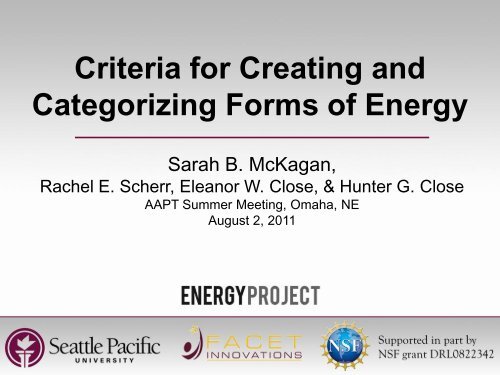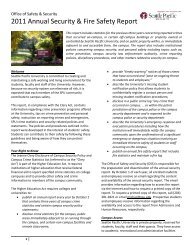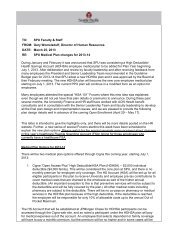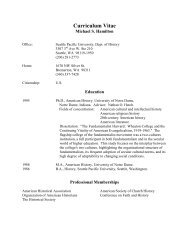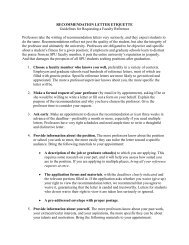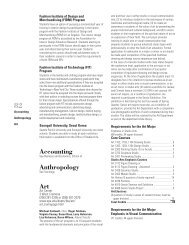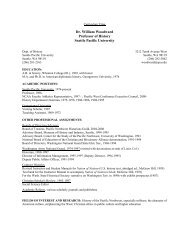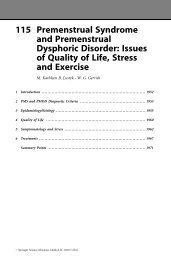PDF Version
PDF Version
PDF Version
You also want an ePaper? Increase the reach of your titles
YUMPU automatically turns print PDFs into web optimized ePapers that Google loves.
Criteria for Creating and<br />
Categorizing Forms of Energy<br />
Sarah B. McKagan,<br />
Rachel E. Scherr, Eleanor W. Close, & Hunter G. Close<br />
AAPT Summer Meeting, Omaha, NE<br />
August 2, 2011
Proposal<br />
Explicitly articulating the criteria used to<br />
identify forms of energy can empower<br />
teachers and students and help them to<br />
understand both the concept of energy and<br />
the nature of science.<br />
2
Instructional Context<br />
Energy Project Professional Development<br />
Course for Elementary Teachers<br />
GOALS:<br />
1. Help teachers to learn about energy<br />
Inquiry-based with respect to content:<br />
Participants construct understanding about energy<br />
by asking questions.<br />
2. Help teachers to experience science as an area where they<br />
and their students are empowered to figure things out<br />
Inquiry-based with respect to method:<br />
Participants construct understanding about what it means to<br />
learn by developing their own standards of evidence.<br />
3
Instructional Context<br />
Energy Project Professional Development<br />
Course for Elementary Teachers<br />
Participants ask & answer own questions by:<br />
• Energy Theater – representing energy transfers<br />
and transformations in real-world scenarios<br />
with their own bodies.<br />
• Small group and whole class discussions<br />
• Calling on the expertise of instructors<br />
• Searching for answers on the internet<br />
4
Dissatisfaction with Forms<br />
Teachers express frustration with seemingly<br />
arbitrary lists of forms:<br />
5
Dissatisfaction with Forms<br />
Teachers want to know:<br />
• Which list is correct?<br />
• Which names should we use?<br />
• Which forms should we teach our students?<br />
• How do other forms fit into these lists?<br />
• What exactly are these lists of?<br />
• How do we know what qualifies as a form<br />
of energy and how are forms categorized?<br />
6
Proposed Definition and Criteria<br />
Definition of Energy Forms:<br />
Energy forms are categories of mechanism by which<br />
energy acts and/or evidence for the presence of energy.<br />
Criteria for Creating & Categorizing Forms:<br />
1. Accounting For All the Energy:<br />
There should be enough forms to account for all the<br />
energy in the scenario being analyzed.<br />
2. Distinguishing Features of Interest<br />
The forms should be subdivided into enough<br />
categories to distinguish all the features of interest in<br />
the scenario.<br />
7
1. Accounting for All the Energy<br />
EVIDENCE: Creating new forms when known forms<br />
don’t add up to satisfy Principle of Conservation of<br />
Energy<br />
PHYSICIST DISCOURSE:<br />
Mass Energy<br />
There should be enough forms to account for<br />
all the energy in the scenario being analyzed.<br />
Neutrino Energy<br />
Postulating mass energy and neutrinos to account<br />
for apparent violations of conservation of energy.<br />
8
1. Accounting for All the Energy<br />
There should be enough forms to account for<br />
all the energy in the scenario being analyzed.<br />
TEACHER DISCOURSE:<br />
Teachers frequently applied<br />
this criterion successfully:<br />
During Energy Theater for a basketball rolling on<br />
the ground, teachers postulated the existence of<br />
thermal energy to account for lost kinetic energy,<br />
even though they could not detect a temperature<br />
change.<br />
9
2. Distinguishing Features of Interest<br />
Forms should be subdivided into enough categories<br />
to distinguish all the features of interest in the scenario.<br />
EVIDENCE: Subdividing forms needed to explain<br />
something and lumping forms together when finer<br />
distinctions aren’t useful<br />
PHYSICIST DISCOURSE:<br />
Kinetic Energy<br />
Rotational, Vibrational, and Translational…<br />
10
2. Distinguishing Features of Interest<br />
Forms should be subdivided into enough categories<br />
to distinguish all the features of interest in the scenario.<br />
TEACHER DISCOURSE:<br />
Teachers struggled to apply this criterion:<br />
Sound Energy<br />
?<br />
=<br />
Motion Energy<br />
?<br />
=<br />
Growth Energy<br />
They were not able to answer the questions:<br />
Is sound energy the same or different from motion energy?<br />
Is growth energy the same or different from motion energy?
2. Distinguishing Features of Interest<br />
Forms should be subdivided into enough categories<br />
to distinguish all the features of interest in the scenario.<br />
TEACHER DISCOURSE:<br />
Teachers struggled to apply this criterion.<br />
They had the tools to distinguish many relevant features.<br />
e.g. They were able to determine that:<br />
• Sound does not exist independent of the motion of molecules.<br />
• Sound involves vibrational motion rather than translational motion.<br />
• Sound is a wave.<br />
• Sound and motion are detected using different techniques.<br />
• We care about sound for different reasons than we care about motion.<br />
• Sound energy appears in state standards for elementary science.<br />
Conclusion: Teachers likely could apply this<br />
criterion if it were articulated explicitly
Conceptualizing New Forms of Energy<br />
After watching presentation where teachers<br />
in another class make up “phase energy”, a<br />
teacher asks:<br />
Is it OK to make up a new form?<br />
Marjorie: Phase energy. I know, we don't have any, we<br />
don’t have understanding or, we'll make something up.<br />
We'll call it phase energy.<br />
Instructor: Mmhmm. Is that okay? Is that what you're<br />
asking?<br />
Marjorie: Yeah. I mean is it okay? Well, yeah, it.. you know,<br />
it accomplished I guess what they set out to<br />
accomplish, but is it real?<br />
13
Conceptualizing New Forms of Energy<br />
Responses from other teachers suggest<br />
understanding of provisional nature of science, but<br />
NOT empowerment to engage in the production of<br />
scientific ideas:<br />
Brian: Isn’t it all arbitrary anyway? ... I mean, you know, thermal<br />
energy – that’s an idea. Like you could have called it pancake<br />
energy if you wanted to.<br />
Anthony: So, in essence, it’s kind of like what the experts which<br />
basically are the people that first like kinda first decided to think<br />
about it and create the benchmark or create the idea. It’d be the<br />
same thing if we called it Blue Bland. Once everybody agrees to<br />
that it’s Blue Bland, as long as it conveys the understanding of<br />
what’s happening to the best of our understanding, then<br />
basically it was okay. Is that kind of the... the thing<br />
14
Conceptualizing New Forms of Energy<br />
Empowerment to produce scientific ideas<br />
may require:<br />
1. explicit understanding of the criteria<br />
OR<br />
2. engagement in real problem that is sufficiently<br />
complex as to require new forms of energy<br />
(e.g Energy Theater)<br />
(two days later Marjorie makes up a new form<br />
in Energy Theater)<br />
15


